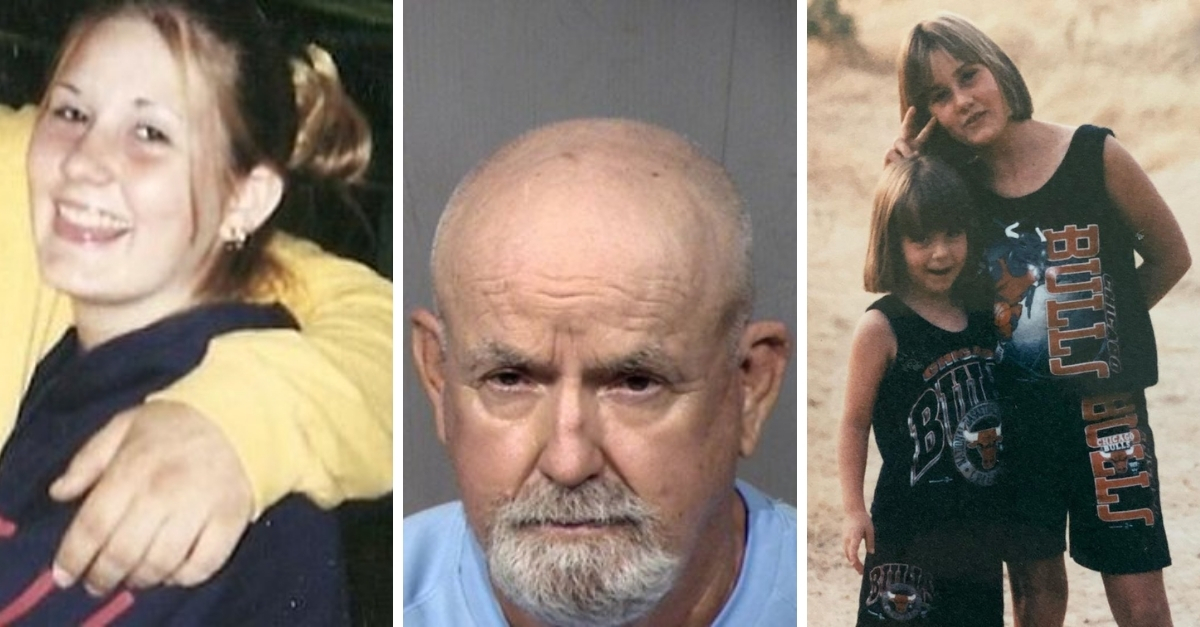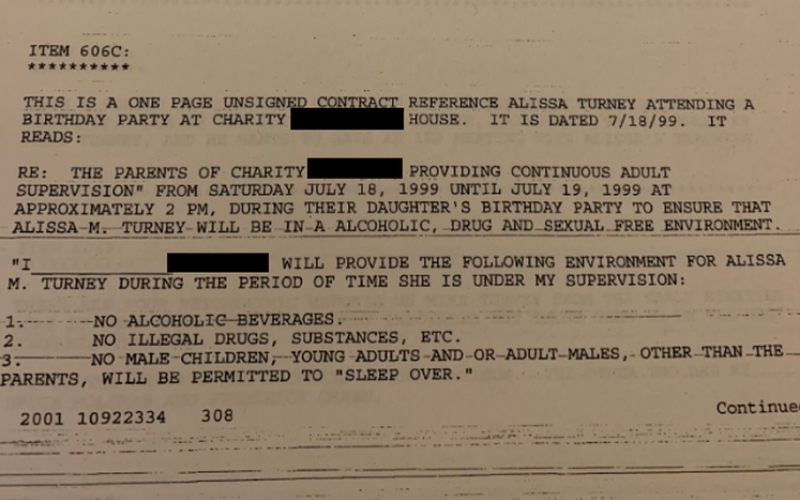
A sister's love is a powerful thing. In the case of Alissa Turney, that love was strong enough to bring justice.
Alissa was just 17 years old when she disappeared after the last day of her junior year of high school. Alissa lived with her stepfather, Michael Roy Turney, and her sister, Sarah Turney, at the time. Michael called the police, stating his daughter had run away. Police treated the case as such, which led to little activity. The truth was much more sinister.
Alissa had confided in friends and adults in her life that her stepfather had been sexually abusing her. Yet no one was willing to go to bat against Michael. The truth wouldn't become known to Sarah until eight years later.
More from LittleThings: Man Shows How 'America's Most Racist Town' Reacts To Him Holding A Black Lives Matter Sign
In December 2008, police executed a search warrant in connection with Alissa's case. They ended up finding a stockpile of explosives that landed him in jail. It was then that Sarah was informed that her father was the main person of interest in her sister's disappearance. It took her a while to come to terms with those facts. Once she did, she began a yearslong pursuit of justice for Alissa.
Sarah worked tirelessly both with and without police help. She got media coverage and even recapped the case in grueling detail on her podcast, Voices for Justice. Finally, that justice seems within reach. Michael was arrested on Thursday in Arizona and charged with the second-degree murder of Alissa.
Alissa Turney's story is full of twists and turns — and the heartbreak of a child whose pleas for help went ignored. Alissa was born on April 3, 1984, to Barbara and Stephen Strahm. Barbara also had an older son from another relationship, John.
The two separated and when Alissa was 3 years old, Barbara married Michael Roy Turney, a former sheriff's deputy and electrician. Michael had three sons from his first marriage. He later adopted Alissa and John. Together, Michael and Barbara welcomed daughter Sarah on October 18, 1988.
In 1993, Barbara was diagnosed with cancer. She died just a year later, when Alissa was 8 years old. With the older boys in different stages of their own lives, Mike was left to raise the young girls alone.
As the girls got older, Mike developed two completely different relationships with the girls. With Alissa, he was an authoritarian. With Sarah, he was a friend.
The clashes between Mike and Alissa grew as she got older. She was a teenage girl more interested in her social life than her academic one. Mike put her down constantly, telling people she was "slow" and speaking of an ADHD diagnosis that there was no evidence of.
Sarah became used to the back-and-forth. It was almost anticlimactic when she came home one day to find her sister's bedroom in disarray and a note saying Alissa had run away.
That day was May 17, 2001. It was Alissa's last day of her junior year at Paradise Valley High School. She'd made plans to attend a party later that night with her boyfriend. She never made it there.
Mike's version of the day's events is that he picked up Alissa from school early. They went to lunch, where they got into a heated argument about Alissa wanting more freedom. Mike maintained he wanted Alissa to follow his rules until she turned 18. The rules he laid out for the teenager were far beyond basic strict parenting, however.

Alissa was subject to contracts that Mike drew up, in which she frequently had to sign in exchange for attending social functions. The contracts largely stated that she wouldn't engage in drug or alcohol abuse or sexual activity.
He also set up an extensive surveillance system throughout the family home. Alissa caught on to the fact she was almost constantly being filmed. All calls into and out of the home were also recorded. Mike would even sit outside Alissa's part-time job at Jack in the Box and record her as she worked. He insisted this was for the girls' safety, not to keep tabs on them.
After Alissa's disappearance, Mike informed police she had run away. He claimed to have received a call from her from a California payphone. Despite the extensive surveillance in the home, he told authorities that the phone call had not been recorded. Video surveillance of that day was also missing.
In 2006, a false confession brought the case back to relevancy. All of these red flags came to the police's attention.
It was during that time that they recognized many of the circumstances of Alissa's disappearance didn't match up with her being a runaway. She left behind her phone and all her personal effects. She hadn't told anyone she was leaving, even her closest friends and boyfriend. Despite Mike's insistence that she was troubled, by all accounts she was a normal teenage girl.
Mike refused to cooperate with the police in person, or take a polygraph. He would only speak to them by phone, email, or fax. Further discussions with those close to her revealed that Alissa had confided in several people that Mike had been sexually abusing her. She'd even told a teacher who dated her father when she was younger, but her cries for help went unanswered. Her friends didn't want to cause troubles, and adults were given reason to doubt her.
The year before Alissa's disappearance, Mike called Child Protective Services to tell them that if Alissa ever filed a child molestation complaint against him, she was lying. The mounting evidence was enough for the police to execute a search warrant on the Turney family home.
When that search happened in December 11, 2008, they found far more than what related to Alissa. They discovered the largest stockpile of explosives the Phoenix Police Department had ever confiscated. They found 19 high-caliber assault rifles, two handmade silencers, a van filled with gasoline cans, and 26 handmade explosive devices filled with gunpowder and roofing nails.
More than 100 neighbors were temporarily evacuated from their homes as a safety precaution. Mike was arrested. They also uncovered a manifesto in which Mike said that members of his old electrical union had kidnapped and killed Alissa, and he had, in turn, killed two men he thought were responsible. He planned to carry out an attack on the union headquarters on December 15. Mike later claimed that the police planted the items in his home and framed him.
At the time of her father's arrest, Sarah was told about everything the police found. When she talked to family members, she learned that most of them suspected Mike was responsible for Alissa's disappearance and presumed death. It took Sarah time to come to terms with the fact that her father might have been involved, but she eventually came around to it.
In March 2010, Mike pleaded guilty to possessing 26 unregistered pipe bombs and was sentenced to the maximum term of 10 years in federal prison. Sarah was told that after he served his sentence, he would be arrested for Alissa's murder.
That wasn't how things played out. Closer to his release date, Sarah was told that Mike couldn't be charged because Alissa's body had never been recovered and they had no confession. She met with her father herself to try to obtain a recorded confession. He taunted Sarah, telling her he would give her answers on his death bed or if the state agreed to execute him by lethal injection within 10 days of his confession.
Sarah would face frustrations with police as she tried to assist in the investigation, determined to get justice for her sister. When they told her to get media attention for the case, she delivered in a major way.
Sarah Turney took Alissa's story everywhere she possibly could. She did interviews, connected with true crime podcasters, attended CrimeCon, and even started a podcast of her own. In Voices for Justice, Sarah relives her pain as she delves through the details of Alissa's case and breaks down all the misconceptions of the father she thought she knew.
When Sarah felt the case wasn't getting enough traction, she raised money to have a billboard put up in the area. She also took to TikTok to share Alissa's story in a social-media-savvy move that drew millions of more eyes to the case. Many of her videos, in which she shares the bizarre life that led her to seek out justice for her sister, have upward of 1 million views.
In February 2019, Alissa's case was submitted to the county attorney's office requesting homicide charges be made against Mike Turney. It would take some more time, but justice is finally within reach.
On August 19, Maricopa County Attorney Allister Adel announced that Michael Roy Turney had been arrested and charged with second-degree murder in the death of Alissa. She credited Sarah's endless commitment to Alissa's case with getting the case to where it currently stands.
"Sarah Turney, your perseverance and commitment to finding justice for your sister Alissa is a testament to the love of a sister," she said.
"Because of that love, Alissa's light has never gone out and she lives on in the stories and photos you've shared with the community. This passion you have demonstrated to her during your journey is something that will keep Alissa's memory alive forever."




